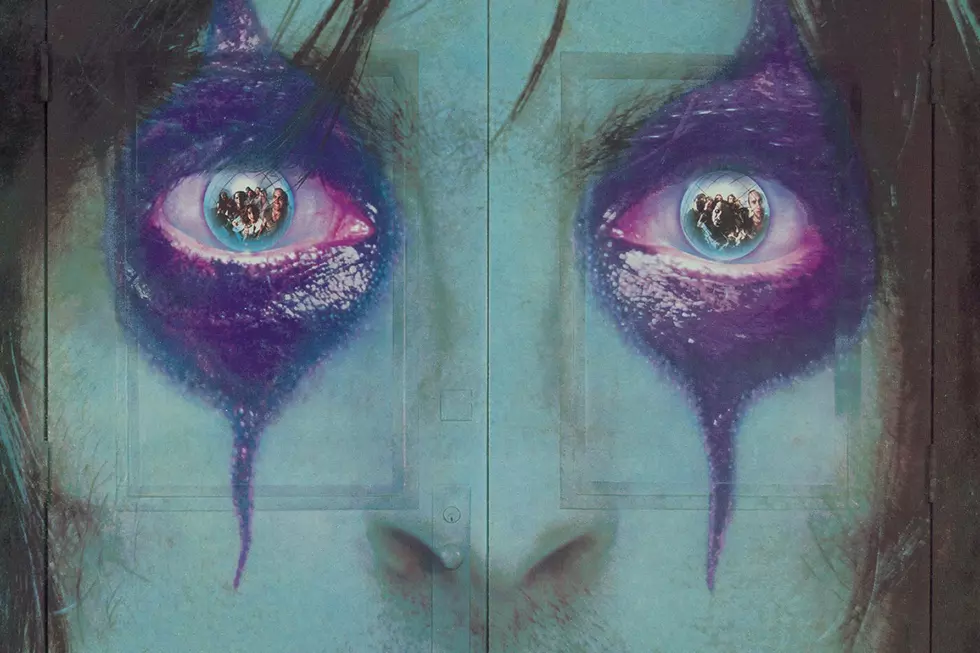
How Alice Cooper Brought ‘From the Inside’ Out of the Sanitarium
After checking himself in to a sanitarium to face down his alcoholism, it’s hardly surprising that Alice Cooper found an entire album’s worth of inspiration.
Having lived through such a life-changing experience, it’s also hardly surprising that he returned to the studio with a different approach to his work. Of course, it therefore follows that Cooper fans who hadn't gone through that experience were surprised and put off by From the Inside, his 11th studio album, which arrived on Nov. 17, 1978.
He checked into a New York sanitarium – not a rehab center, but a place where people with severe mental illness were cared for – more than a year earlier. Rumored to have built up an extreme drinking addiction over the previous decade, Cooper was said to have been coughing up blood every morning before downing 24 beers during the course of each day.
“I wasn’t a drunk drunk. … I was never falling down, nobody had to carry me home,” he admitted in 2017. “I was always on this golden buzz. Kinda this Dean Martin thing.”
Cooper's doctor “told me that if I stopped drinking, I could probably record 20 more albums – but if I didn’t, in two weeks I’d be playing with my friends Jim Morrison and Jimi Hendrix up in Heaven,” Cooper said in a separate interview. “I didn’t realize that I was an alcoholic until I realized that the alcohol was not for fun anymore. It was medicine."
As he dealt with his addiction over a period of months, the artist in him couldn’t fail to be impacted by the fellow patients he encountered. “Every single character [I met was] a song,” Cooper told the Quietus in 2009.
Upon release, Cooper quickly made contact with Bernie Taupin, Elton John’s lyricist.
“Bernie was my best friend before I went into the hospital,” Cooper said. “So when I came out I said, ‘Bernie, I’ve got a wealth of material. We have to sit down and write this.’” He called the process as “fun,” saying “it was sort of like dueling with each other. And we’d always try to leave the other guy with one unrhymable last word, you know? So Bernie and I would sit there and I’d tell him about characters like Jackknife Johnny, a Vietnam vet and I’d say, ‘Ok, here’s the story – he married a girl, he came home, everybody rejected him and then on top of it they rejected him because he brought home a Vietnamese girl,’ and so it just started right there. And pretty soon we’d written a whole album like that.”
Along with “Jackknife Johnny,” (“You still carry the shrapnel / You're shell-shocked and dazed”), lead characters included “Nurse Rozetta” (“She's got the Devil's light”), “Millie and Billie” (“God made love crazy so he wouldn't feel alone”) and Veronica, while others featured in “Wish I Were Born in Beverly Hills,” “The Quiet Room” and “Inmates (We’re All Crazy)."
David Foster was recruited to produce and co-write, while Cooper’s guitarist Dick Wagner and Toto's Steve Lukather were also involved. The stops were pulled out when it came to studio collaborators: As well as those three musicians, From the Inside featured a wide range of well-known session names, along with Elton John band guitarist Davey Johnstone and Dee Murray. “I really did have everybody in the world on it,” Cooper reflected later.
With the work completed, lead track “How You Gonna See Me Now” achieved promising chart success on its release a month before the LP. An early example of what came to be known as the power ballad, it was written for Cooper’s wife – who, since getting together with him four years previously, had never seen him sober. Yet it could also be a message to his audience: “How you gonna see me now / Since we've been on our own / Are you gonna love the man / When the man gets home?”
Listen to Alice Cooper's "How You Gonna See Me Now"
Despite the new sheen and the clever lyrics, From the Inside release was not a success, reaching only No. 60 on the Pop Albums chart; while the title track was a flop as a single. Critical responses suggest two main reasons why it didn’t land with fans: First, the studio band’s proficiency didn’t set well against Cooper’s push-and-pull sleaze rock vibe; and second, his trademark black comedy angle appeared to have been set aside in favor of a straight-on approach.
“‘I just can’t get these damn wrists to bleed’ is a great line – sending up every phony suicide attempt you’ve ever known,” Rolling Stone said in a review. “Yet Cooper sings it as a tragic howl from the depths and thereby misses his own point.”
It's been many years since any of From the Inside tracks appeared in his set list; even “How You Gonna See Me Now” was last been performed in 1980. Yet Cooper himself remains proud of the LP. Perhaps, for him, it marks the moment he felt able to continue dealing with his creativity and success without having to rely on alcohol to see him through: “It was musically one of the best albums I ever did,” Cooper insisted in 2009, decades after its release.
Rock's Most Overshadowed Debuts
Gallery Credit: UCR Staff
See Alice Cooper's Spouse in This Video of the Hottest Rockstar Wives
More From KKTX FM










